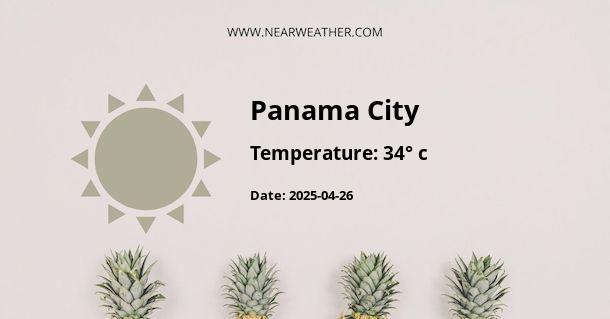Panama Climate and Weather Overview
Panama, located in Central America, is known for its diverse climate and varied weather patterns throughout the year. The country's unique geographical features, including its mountain ranges and coastal plains, contribute to the wide range of temperatures and precipitation levels experienced across different regions. Understanding the climate and weather variations in Panama is crucial for travelers and locals alike, as it can significantly impact outdoor activities, agricultural practices, and overall lifestyle.
Climate Zones in Panama
Panama's climate can be broadly categorized into two primary zones: the tropical rainforest climate and the tropical savanna climate. The presence of these climate zones is mainly attributed to the country's proximity to the equator and its topographical diversity.
Tropical Rainforest Climate
In Panama, the tropical rainforest climate prevails along the Caribbean coast and in the northern regions of the country. This climate zone is characterized by high levels of humidity and abundant rainfall throughout the year. The average annual precipitation in these areas often exceeds 3,000 mm (118 inches), contributing to the lush and dense rainforests that are emblematic of this region. Additionally, temperatures in the tropical rainforest climate zone remain relatively consistent, with average highs ranging from 29°C to 32°C (84°F to 90°F) and lows between 22°C and 24°C (72°F to 75°F).
Tropical Savanna Climate
The tropical savanna climate, on the other hand, is predominant in the southern and western parts of Panama, including the Azuero Peninsula and parts of the Pacific coast. This climate zone experiences distinct wet and dry seasons, with rainfall primarily concentrated between May and November. The average annual precipitation in these areas ranges from 1,500 mm to 2,000 mm (59 inches to 79 inches). During the dry season, which occurs from December to April, Panama's savanna regions often encounter drier conditions and relatively lower humidity levels. The average temperatures in the tropical savanna climate zone are comparable to those in the rainforest climate zone.
Weather Variation Throughout the Year
Understanding the weather patterns in Panama throughout the year is vital for planning trips and activities. The country experiences two primary seasons: the dry season (verano) and the wet season (invierno), each offering unique weather conditions and opportunities for different types of experiences.
Dry Season (Verano)
The dry season in Panama typically spans from mid-December to mid-April. During this period, the country experiences lower precipitation levels and reduced humidity, making it an ideal time for outdoor adventures, beach visits, and exploring various ecological reserves. The clear skies and generally sunny weather during the dry season provide excellent conditions for travel and outdoor recreational activities across the country. Visitors can take advantage of the favorable weather to partake in hiking, birdwatching, and other nature-oriented pursuits.
Wet Season (Invierno)
The wet season in Panama extends from mid-April to mid-December, bringing increased rainfall and greater humidity levels. While the wet season may deter some outdoor activities, it is a period of vibrant green landscapes and flourishing flora, offering unique opportunities for exploring the country's rich biodiversity. The wet season is also a crucial time for agricultural activities, as the ample rainfall supports the cultivation of various crops. Travelers during this season should be prepared for spontaneous rain showers and occasional thunderstorms, which are characteristic of the tropical climate.
Climate Challenges and Considerations
Panama's climate presents specific challenges and considerations, particularly in relation to environmental conservation, infrastructure development, and disaster preparedness. The country's vulnerability to natural hazards, such as tropical storms and flooding, underscores the importance of proactive measures to mitigate risks and protect communities.
Extreme Weather Events
While Panama generally enjoys favorable weather, it is susceptible to extreme weather events, including tropical storms and hurricanes, especially along the Caribbean coast. The occurrence of these events can lead to significant disruptions in communities and pose substantial challenges for infrastructure and public safety. Understanding the seasonal patterns and monitoring weather forecasts are critical for residents and authorities to prepare and respond effectively to these potential threats.
Environmental Conservation
The diverse climate and ecosystems in Panama underscore the significance of environmental conservation and sustainable practices. The country's rich biodiversity, including its tropical rainforests and diverse wildlife, requires concerted efforts to preserve and protect these natural assets. Climate change and its associated impacts further emphasize the need for sustainable initiatives and policies aimed at safeguarding Panama's environment for future generations.
Conclusion
Overall, Panama's climate and weather patterns reflect the country's ecological diversity and offer a range of experiences for both residents and visitors. From the tropical rainforests to the savanna regions, Panama's climate zones shape the landscapes and lifestyles of its inhabitants. Understanding the nuances of the climate and weather variations throughout the year is fundamental for effectively navigating and appreciating the distinct characteristics of Panama's natural environment.
A - Panama City's Latitude is 8.993600 & Longitude is -79.519730.
A - Weather in Panama City is 34° today.
A - Climate Conditions in Panama City shows scattered clouds today.
A - Humidity in Panama City is 47% today.
A - Wind speed in Panama City is 25.92 km/h, flowing at 340° wind direction. today.
